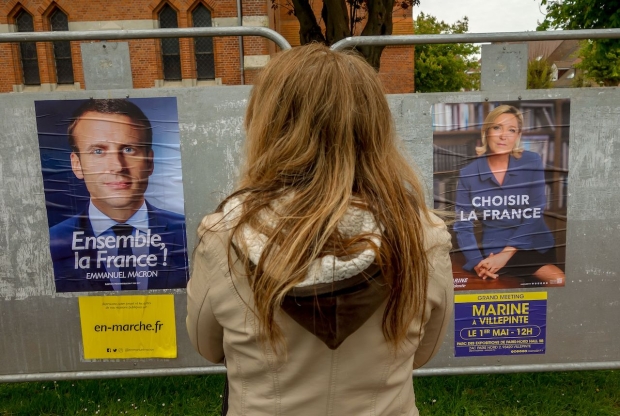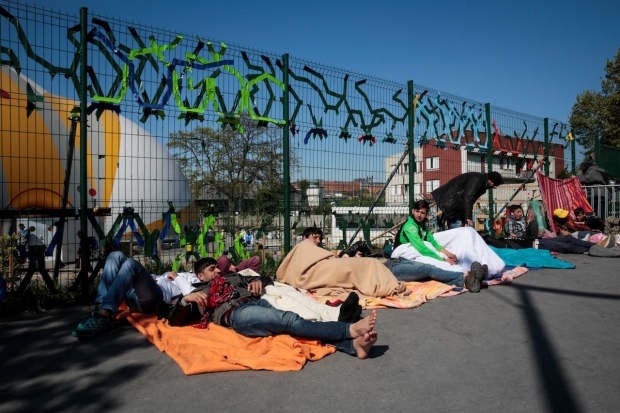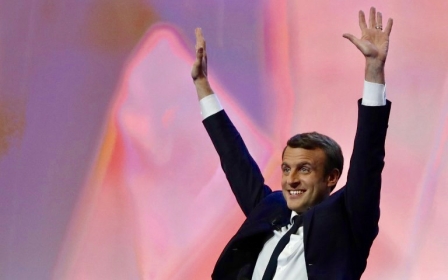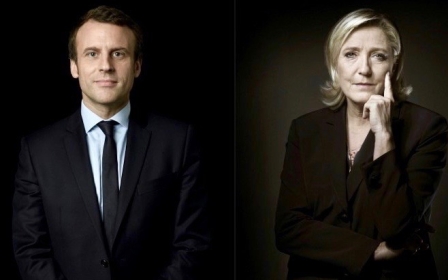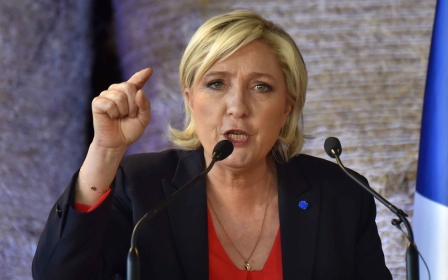The Middle East, secularism, refugees: The programme of Emmanuel Macron
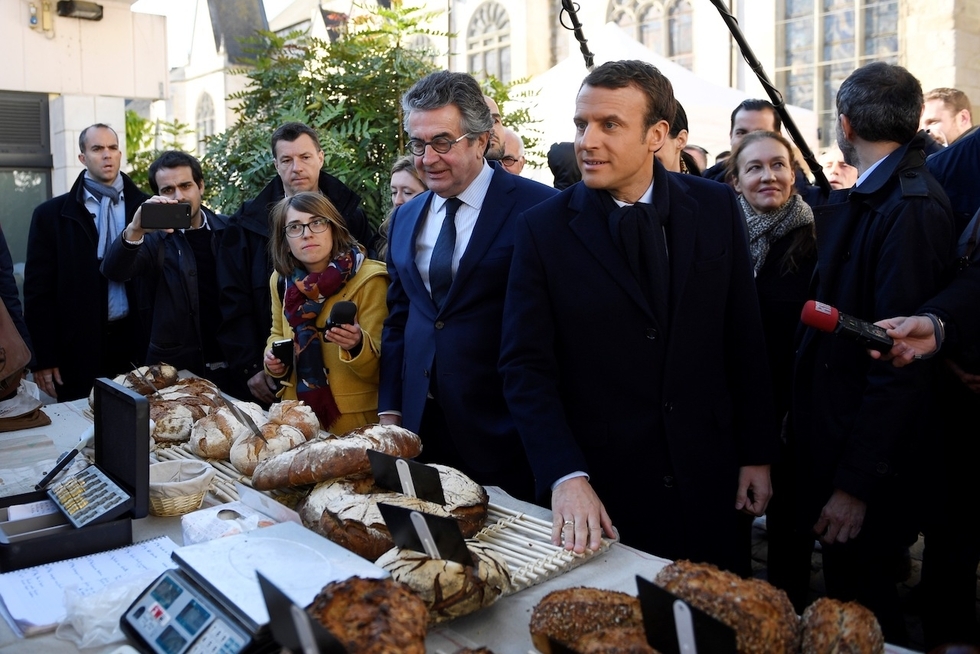
The international section of French presidential frontrunner Emmanuel Macron’s programme places the focus on independence.
"I'd like to put into effect clear and determined diplomatic policies, in the tradition of De Gaulle and Mitterrand, to establish France as an independant, humanist, European power," it reads.
While seemingly a far cry from the neo-Atlanticism of former president Nicolas Sarkozy and the current president, Francois Hollande, the details are more complicated.
The first-round finalist was clearly the most pro-European of the 11 candidates on the campaign trail. His programme calls for a eurozone with its own budget, parliament, and economy minister. Macron is also the only candidate in favour of the Canada-EU Comprehensive Economic Trade Agreement (CETA).
As to France's role on the world stage, Macron has outlined a vision based on collaboration among four entities: the national forces, European treaties (with reciprocal protection clauses), NATO and the UN system.
In particular, regarding NATO, he says that "it is not in France's interest to question its place in [NATO's] integrated military command," but that France will try to "limit NATO interventions beyond its geographical reach to those cases alone which directly impact the interests of France."
Macron points out that France, in the wake of Brexit, is the only European Union permanent member of the UN Security Council with a right to veto, which would give France leverage "to promote common EU interests and positions within the organisation".
He would also advocate the expansion of the Security Council, maintaining that "Germany, Japan, India and Brazil, as well as a country from Africa" should be granted permanent member status.
As regards the United States and Russia, Macron appears to have taken an opposite side to his rival Marine Le Pen in Europe's neo-Cold War games. Although he states at the start of his foreign policy programme that "the presidency of Donald Trump is of concern to our citizens," he goes on to add that "we are lucky to have close relations with the United States and our allies".
However, he also points out that the prospect of gradual withdrawal of the United States coupled with the growing security challenges facing Europe will force France to adopt "a joint European foreign and defence policy" though this vision does not necessarily include all 27 member states.
He sees it rather as part of a "variable-geometry" Europe in partnership with "those member states which are ready to move forward".
His position on Russia seems to exclude any rapprochement: "Vladimir Putin's Russia is playing a dangerous foreign policy game, which unhesitatingly brushes aside international law."
Though Europe, in his view, "is destined to come to an agreement" with Russia on the situation in Ukraine, Macron maintains that sanctions "exist and will be necessary as long as the Minsk agreements [the Ukraine ceasefire signed in September 2014] are not upheld," though at the same time he would consider lifting them "if the situation in Ukraine invites us to".
He further states that the NATO-Russia dialogue must not be "abandoned".
Regarding Syria, Macron has claimed to be in favour of a French military intervention in the country if President Bashar al-Assad's government proves to be responsible for the chemical attack on Idlib. He also sets down another condition, that the intervention be carried under the aegis of the UN – where Russia holds the power to veto.
With this in mind, Macron declares that "the right of veto must be framed with precision for cases involving proven risks of mass crimes".
Overall, he believes that "toppling the regime of Bashar al-Assad" should not be "a prerequisite for every decision," contrary to the position of Francois Hollande, the main goal being "to combat IS, the al-Nusra Front, etc". Macron means to give priority to political dialogue, while refusing to allow "the United States and Russia, which are deeply opposed on the issue, decide the fate of Syria".
In short, the En Marche president's middle-of-the-road policy would sharply contrast with Hollande's open support of the rebellion as well as the call for dialogue with the government advocated by certain candidates, including Marine Le Pen.
On Palestine-Israel, Macron aligns himself with French tradition: "The security of Israel is an unchangeable principle as is the legitimacy of the Palestinian state. We must look for the conditions for a lasting peace and stability to enable the two states to coexist in peace."
On the other hand, he positioned himself against the unilateral recognition of Palestine, declaring last 9 April on the Jewish community radio, Radio J, that such recognition "would serve no purpose".
He is also opposed to the Boycott, Divestment, Sanctions (BDS) movement, claiming on the same radio channel that the call to boycott amounts to "anti-Zionist methods and is therefore deeply anti-Semitic".
His programme also questions relations between France and Saudi Arabia, unlike the foreign policy of both Hollande and Nicolas Sarkozy, which were seemingly strongly aligned with the Gulf monarchies. Macron states that France should "engage talks with [both] Saudi Arabia and Iran" without "interfering in the two countries' power games".
Neglecting or opposing Iran's national policies would be "an error" which would undermine "the authority of France". Likewise "it would be an error to show excessive support of Saudi Arabia, as we have in the past" - yet another middle-of-the-road stance advocating "serious dialogue with the two regional powers".
This includes taking a tough stand on Iran on issues of nuclear non-proliferation. He adds that while any overtures towards the country would have to continue, it is on the condition that Iran respects the 2015 nuclear agreement and "contributes to regional stability".
More of the same when it comes to Saudi Arabia, "which should commit to responsible policies and under no circumstances sanction movements promoting violence and terrorism".
When asked about France's arms sales to Riyadh, however, the candidate dodged the issue, asserting "not that many weapons had been sold". Yet Saudi Arabia and Qatar buy more French weapons than any other country, with respectively $13bn and $8.7bn each in contracts.
Still on the subject of the Middle East, he says France "will continue supporting Lebanon," which is seen as a historic protectorate of France.
Regarding Turkey, Macron cautiously points out that given "the current situation, the prerequisites for Turkey to join the EU have obviously not been met, and recent developments in the country do not bode well for a positive outcome. Nonetheless, Europe, he claims, must not shut the door on Turkey."
France's ever-sensitive relations with Algeria are only indirectly addressed in the candidate's programme. Calling France a "defender of humanism," Macron maintains that French diplomatic efforts must "focus on sub-Saharan Africa, on the Sahel, on Maghreb, on countries hit by crisis, and on the French-speaking world".
Beyond those conventional statements, however, the balancing act he performed regarding the tricky question of Algeria gives us an indication of future policies. French colonisation was "a crime against humanity," Macron was quoted as saying during a visit to Algeria last February.
The remarks were apparently made to compensate those made in November 2016, when he had maintained that in "the reality of colonisation" there were "elements of civilisation, and elements of barbarism". The immediate outcry in France led to an astonishing change of rhetoric however, now referring to a "crime against the human".
With regards to admitting refugees, Macron says France needs to "take its responsibility". He places the issue at the heart of a collaborative European effort and calls for "tighter and more efficient border controls" as well as "the combatting of organisations and criminal networks, [with a] balanced allocation of refugees among EU countries". Asylum reform aimed at "speeding up" the process is also on the agenda.
As for Libya, he also approaches the question from the angle of the refugee crisis, with Europe, once more, seen as a lever for actions "to stabilise Libya and to curb the human trafficking that is causing such intolerable tragedies throughout the Mediterranean".
More broadly, the En Marche candidate sees immigration, and in particular the welcoming of foreign students from Africa among others, as "a source of good fortune and pride". He makes no mention of modifying current legislation and intends above all to promote better conditions for integrating foreigners.
Terrorism, and in particular the fight against the Islamic State group, is extensively covered in the candidate's programme: "The terrorist networks of al-Qaeda and IS are a strategic challenge for France." That said, Macron goes on to add that "we need to understand why there are 'breeding grounds' in France, and why we are responsible for them". Thus the question of terrorism is placed at the crossroads of an "economic, social, cultural and religious battle".
Terrorism therefore is not only seen as an outside threat but as an issue forcing the country to confront "the fact that our society, our economy has produced anomie, a sense of exclusion, individual fates that have pushed certain people to commit those atrocities," adding that "Islamist ideology ... would not have such a hold on young French people if the Republic had not left some of its young behind".
Lastly, the divisive issue of France's particular brand of secularism, laïcité, is addressed. Interpreting the law of 1905, which lays down the foundations of secularism in France, Macron remarks, as if to distance himself from the debate, that "the discussions about laïcité are contentious. But the practices … are much more peaceful."
"The Republic," he adds, "must allow citizens to fully uphold their convictions, so long as they do not interfere with the beliefs of others or with the rules to which everyone is bound."
The place of Islam, the second-largest religion in France today, does not call for an amendment to the 1905 law, according to him. He nevertheless calls for government policies enabling "the Muslims of France to continue to build institutions representative of their faith in the country, in order to resolutely combat all forms of radical excess diverting the values of this religion".
Two courses of action are laid out: to train imams in France according to values consistent with the Republic, and to fight the spread of "jihadist" ideology, including by closing down any place of worship which promotes it.
Regarding the ban of ostentatious religious signs in school, given "its broad support across French society, the law should be maintained," he says. It should not, however, be extended to higher education. "[University] students are adults who are responsible for their actions."
Laïcité, it can't be said enough, is a freedom before being an interdiction. It is a text promoting tolerance.
As for the burkini ban, it "was justified in some places, for reasons of public order ... It is crucial to carry out a political battle, an ideological battle, to say that this piece of cloth is contrary to our idea of civility and equality between men and women. The burkini is contrary to these ideas."
But at the same time, Macron has said "it is crucial to stand up for individual freedoms when some people choose to dress a certain way. It's a terrible failure to see police officers on a beach asking a woman, in the name of secularism, to stop wearing a burkini."
Middle East Eye delivers independent and unrivalled coverage and analysis of the Middle East, North Africa and beyond. To learn more about republishing this content and the associated fees, please fill out this form. More about MEE can be found here.


